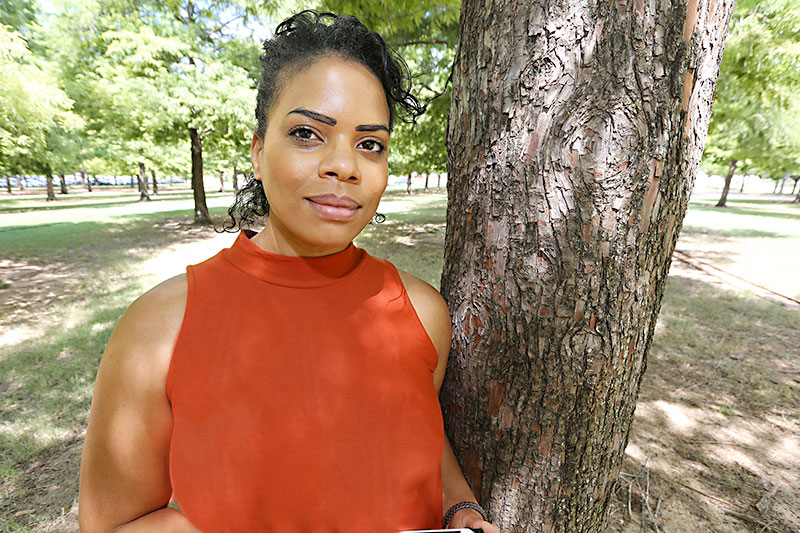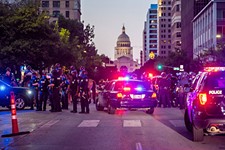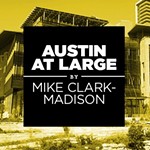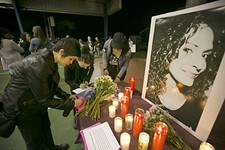What to Make of It
Local activists seek justice for black lives
By Kahron Spearman, Fri., July 15, 2016
While the nation, and the state of Texas, continues to come to terms with tragic recent losses of life, we're left with few concrete answers to an ever-growing list of questions.
The deaths of five Dallas officers on July 7 – gunned down in an ambush by apparently disturbed lone actor Micah Johnson – came on the heels of two more deaths, Alton Sterling in Louisiana and Philando Castile in Minnesota, at the hands of police officers. There's a certain terrible irony, especially in the livestreaming of Castile's death by his distraught partner, with the distances created by all three individual, but intrinsically linked, events.
Activist Meme Styles, who runs the data-driven community organization Measure Austin, explains how she found out about Castile's death. "Me and Cliffton [Styles' fellow activist and husband] were talking about [Sterling's death], and it was so sad, just kind of like feeling all these different feelings. And then, we're on Facebook, and 'bam' – a live feed of Philando's murder."
"Being hit with that one at the same exact time, and then actually seeing it happen live ... that painted a new normal in what's happening in our culture."
It's become increasingly difficult, however, to neutralize what Austin Police Chief Art Acevedo described at a press conference Friday afternoon as "painting people with a very broad brush." Social media was supposed to bring us together; instead, some observers note the continuance, or even rise in, nuance-lacking conversations.
"We want to talk about unity, but technology's almost distanced us," says Styles. "Also, [we're] repeatedly shown [images] of brutality and injustice. It's to the point that it's become the norm. It's like standard in the belief that [these images are] the majority of what's happening." The conclusion many people draw, Styles says, is, "So then, 'all police are bad,' and all of us black people believe police are bad."
"It's caused fear. It's caused anger. It's caused resentment. It's really not the truth. One of the organizers [at Thursday night's Sterling and Castile rally at Givens Park] mentioned, 'Chief Acevedo is here in the crowd. Turn to him, and tell him what you think.' Something like that could have made Austin turn into Dallas. It's just that delicate right now."
To Styles' point, these recent killings and their aftermaths have caused massive confusion and concerns in both police/community communications and race relations. However, local activists including Styles and Black Lives Matter organizer Margaret Haule have been working toward solutions, some already in place following the death of teen David Joseph at the hands of now-former APD officer Geoffrey Freeman (see "The Sanctity of All Life?," Feb. 12). Most of the solutions involve intra-citizen resolution.
"We're more focused on doing the work ourselves. We give people alternatives to calling the police," explains Haule, whose chapter also works toward holistic solutions in education and general health. "When David Joseph was killed, we did an emergency rapid response, canvassing in that neighborhood on Yager and I-35, the neighborhood where he was killed. We knocked on over a hundred doors and we told people, 'If you see someone in mental distress, call the Mental Health Hotline' [512/472-HELP]. It's 24 hours and is operated by Austin Travis County Integral Care. Also, if you do ever call the police, ask for a Crisis Intervention Team Officer, a CIT Officer."
"We're trying to give people alternatives. We're also trying to reduce the role of government institution interference in our lives."
The difficulties in this are historical realities that cities largely tend to disperse their police where they believe the crime is happening – poor, minority-populated neighborhoods – while not placing wholesale emphasis on why crime is generally being committed.
Secondly, police departments are often mistakenly perceived as autonomous entities, answering to themselves, and not necessarily to the city or taxpayers that fund public safety. There's the police, and then there's everything else.
Frankly, the deaths of Castile and Sterling – and numerous other black and Latino citizens – add more statistical fuel to the realities facing these groups. In response to Mike Huckabee's assertion that "male lives matter" should be a more appropriate cause, given that males (of all races) are largely those killed, The Washington Post offered the following:
"According to the most recent census data ... white people make up roughly 62 percent of the U.S. population but only about 49 percent of those who are killed by police officers. African Americans, however, account for 24 percent of those fatally shot and killed by the police despite being just 13 percent of the U.S. population. [Black] Americans are 2.5 times as likely as white Americans to be shot and killed by police officers. [Because] the white population is approximately five times as great as the black population, that means unarmed black Americans were five times as likely as unarmed white Americans to be shot and killed by a police officer."
As recorded in the Post's Fatal Force database, these statistics have roughly held true for blacks in Texas, and for Latinos – who have nearly as many deaths (10) at the hands of police so far this year. Moreover, there's a curious and dangerous inequity in police handling of mental health interactions, similar to David Joseph's death, as 12 of the 46 total people shot or killed in Texas this year (all races) involved a mental health disturbance.
"The Science of Justice: Race, Arrests, and Police Use of Force," a fresh-off-the-presses report by the Center for Policing Equity analyzing 12 law enforcement departments across the country, found that the use of force rate is disproportionately high for blacks, at 273 per 100,000 residents. That's 2.5 times as high as the overall mean use of force rate (108 per 100,000) and 3.6 times as high as for whites (76 per 100,000). According to the study, "participating departments revealed racial disparities across multiple levels of force severity," and that severity of force used was also demonstrably worse for blacks.
At last Friday's press conference, Acevedo suggested that detractors gain an up-close perspective. "I would invite people who want to know what it's like to be a police officer, don't watch it on TV. Ride along with our officers, see for yourself. Get the perspective that will give you a true assessment." He also encouraged, as Dallas chief David Brown did more recently, that people sign up for officer training.
In a startlingly candid assessment, Acevedo stated that "the problem is that when we have this rhetoric nonstop, against policemen, 24/7, it fuels the minds of people that may not be all there to start with."
The inherent question is: Of all professions available in America, why wouldn't deep psychological evaluation and (continuous) background checking rest at the foundation of prospective officer resourcing – especially given the longstanding knowledge (substantiated by a 2006 FBI report, "White Supremacist Infiltration of Law Enforcement") that white supremacists and racist sympathizers have infiltrated America's police force?
In the end, there must be full and fair integration of the police with its black and Latino citizenry, at a human level. Many questions remain unanswered, but there are some gains being made, at least in Dallas and Austin. "With Measure Austin, people don't realize we've been working with the police. We have our problems here, but Austin has come a long way," emphasizes Styles.
Styles points to the significance of both Mayor Steve Adler and Chief Acevedo's public response following the death of David Joseph. "I've never seen in my life, [the mayor coming out saying] 'black lives matter,' and then on the same day – an hour later – the police chief comes out and says, 'black lives matter.'
"Seeking justice for black life has to be a holistic effort," says Styles. "Honestly, we cannot think that police and community are two separate entities. When we say community, we have to [also] mean the police."
Got something to say on the subject? Send a letter to the editor.













